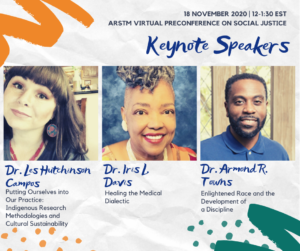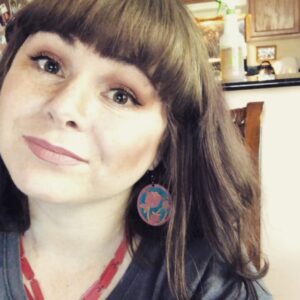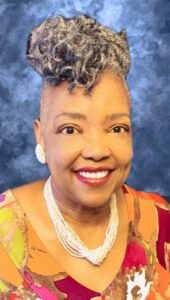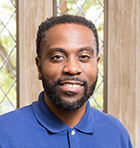As the chair of the 2020 ARSTM@NCA Virtual Preconference on Social Justice, I am thrilled to announce our distinguished keynote speakers:

The keynote panel will open the synchronous preconference events, and will set the stage for our ongoing conversations about RSTM and social justice, both during the preconference and beyond, as we take what we learn into our research, teaching, community, and workspaces. Our three keynote speakers have expertise in science, technology, and medicine and bring new perspectives on all three to the study of rhetoric. Each of them challenges us to engage social justice, not as an objective abstraction, but as an ethic that can help us understand the world and make change within our spheres of influence.
Dr. Les Hutchinson Campos, “Putting Ourselves into Our Practice: Indigenous Research Methodologies and Cultural Sustainability”
 Bio: Dr. Les Hutchinson Campos is an Assistant Professor of English at Boise State University in the Technical Communication Program. Les serves their program as the Teaching Assistant Mentor, Coordinator of Curriculum, and the Anti-Racist Student Support Consultant. Les’s research connects cultural and digital rhetorics with technical communication and Indigenous Studies, primarily studying online safety practices BIPOC use within our communities. They have published articles regarding medical rhetorics, privacy policies, doxing, online identity management, and storytelling.
Bio: Dr. Les Hutchinson Campos is an Assistant Professor of English at Boise State University in the Technical Communication Program. Les serves their program as the Teaching Assistant Mentor, Coordinator of Curriculum, and the Anti-Racist Student Support Consultant. Les’s research connects cultural and digital rhetorics with technical communication and Indigenous Studies, primarily studying online safety practices BIPOC use within our communities. They have published articles regarding medical rhetorics, privacy policies, doxing, online identity management, and storytelling.
Abstract: In their talk, Dr. Les Hutchinson Campos presents a meditation on Indigenous research methodologies and how we can use our selves and our communities as guides in practicing cultural sustainability and social justice. Through storytelling and narrative, Hutchinson Campos offers practical strategies that researchers and practitioners at any stage in their career can adopt to engage in more ethical and inclusive work that lessens the harm done to our land, water, air—the planet as a whole. Citing Indigenous scholarship by Robin Wall Kimmerer, Thomas King, Louise Erdrich, Linda Tuhiwai Smith, and others, Hutchinson Campos models Indigenous research practices of relationality and constellation in the form of entertaining musings mixed with explicit takeaways. Audience members will leave this talk with ideas for planning and conducting communally and environmentally sustainable research methods to use in their work and everyday lives.
Dr. Iris L. Davis, “Healing the Medical Dialectic”
 Bio: Dr. Iris L. Davis is a physician with over 30 years of experience as a physician and medical acupuncturist. She is board certified in internal medicine and integrative holistic medicine as well as a fellowship in metabolic and nutritional medicine with the American Academy of Anti-aging Medicine. A graduate of the University of Virginia Medical School, she has worked and taught extensively in primary care medicine in the public and private sectors with special interests in urban medical care, HIV/AIDS, geriatrics and other areas. Her interests in health care access, cultural diversity, patient empowerment and the impact of those issues in health care have been career long.
Bio: Dr. Iris L. Davis is a physician with over 30 years of experience as a physician and medical acupuncturist. She is board certified in internal medicine and integrative holistic medicine as well as a fellowship in metabolic and nutritional medicine with the American Academy of Anti-aging Medicine. A graduate of the University of Virginia Medical School, she has worked and taught extensively in primary care medicine in the public and private sectors with special interests in urban medical care, HIV/AIDS, geriatrics and other areas. Her interests in health care access, cultural diversity, patient empowerment and the impact of those issues in health care have been career long.
Abstract: This discussion will be oriented to examining the historical legacy of medical care in the United States and discussing how the practice of medicine resonates at variance with the population needs and the stated directives of care.Definitions of medical care, the populations that are chosen to be served and those that are chosen for other criteria will be discussed from a historical perspective consistent with the historical differences between class and ethnicissues in the United States since its inception. The long term history of those actions and how medicine is conducted in the United States has now led to the most expensive health care system in the developed world with significant healthmeasures that show the significant discrepancies that exist for non European Heritage populations, ongoing losses in primary and specialty care for nonEuropean heritage populations and non wealthy populations. The issues of a system that cannot speak to the burdens of care needed by the majority of the country will be reviewed in the discussion.
Dr. Armond R. Towns, “Enlightened Race and the Development of a Discipline”
 Bio: Armond R. Towns is an assistant professor in the Department of Rhetoric and Communication Studies at the University of Richmond. He is increasingly interested in Western man’s overrepresentation as the human in both science and philosophy and alternative genres of the human outside Western man’s vantage point. This leads Professor Towns to ask questions about race, gender, sexuality, class, time, and space.
Bio: Armond R. Towns is an assistant professor in the Department of Rhetoric and Communication Studies at the University of Richmond. He is increasingly interested in Western man’s overrepresentation as the human in both science and philosophy and alternative genres of the human outside Western man’s vantage point. This leads Professor Towns to ask questions about race, gender, sexuality, class, time, and space.
Abstract: Jurgen Habermas has been viewed as a central theorist of the relationship between philosophy and communication. His work is based on the argument that the Enlightenment should not be fully thrown out, but celebrated for the distribution of communicative and democratic relations. This talk will examine the relationship between questions of rationality and objective science that emerged during the post-Enlightenment period, that which Habermas and communication studies have celebrated. Alternatively, we will examine the shifting politics of race that happened in the same time period, particularly within a context of increasingly rationality and objectivity. We will consider how the discussion of race increasingly moved into biological arguments during the mid-nineteenth century, and how such shifts would go on to influence the development of communication and rhetoric in the twentieth century as disciplines concerned with scientific investigation.